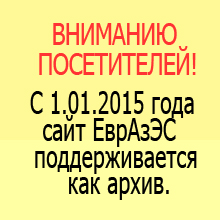|
STATUTE OF THE COURT of the Eurasian Economic Community Approved by Resolution of the EurAsEC Interstate Council 27 April 2003, No. 122
STATUTE OF THE COURT of the Eurasian Economic Community
1. The Court of the Eurasian Economic Community (hereinafter referred to as the Community Court) was established in accordance with Articles 3 and 8 of the Treaty on the Establishment of the Eurasian Economic Community of October 10, 2000 (hereinafter referred to as the Treaty) to ensure that the states – members of the Eurasian Economic Community (hereinafter referred to as the Community) shall apply this Treaty and other treaties in force in the Community in a uniform manner. The Community Court also deals with disputes of economic character arising between the Parties on matters relating to the implementation of resolutions of organs of the Eurasian Economic Community and the provisions of treaties in force within the Community, and hands down interpretations and rulings on them. 2. The organization, working arrangements, and jurisdiction of the Community Court are determined by the present Statute, which shall be adopted by the Interstate Council. 3. The main tasks of the Community Court are to ensure the uniform application of the Treaty and other international treaties in force in the Community, as well as of resolutions of organs of the Community. 4. The Community Court also deals with interstate disputes of economic character: a) arising in the course of application of the Treaty and other treaties in force in the Community, as well as of resolutions of organs of the Community; b) arising out of the fulfillment of obligations under international treaties in force in the Community and resolutions of organs of the Community. Disputes of other character arising out of international treaties in force in the Community may be also referred to the Community Court. 5. The Community Court adjudicate disputes on the motion of interested Parties represented by governments of the states concerned. 6. The Community Court adopts a decision based on the results of hearings and recommends measures for its implementation. The decision of the Community Court is final. Every member state of the Community is bound by the decision of the Community Court in a case in which the said state is a Concerned Party. The decision of the Community Court is implemented by relevant organs of the Concerned Parties in accordance with national legislation within the period defined by respective governments as three months from the date of the decision. A decision of the Community Court is deemed adopted if not less than two-thirds of the total number of judges appointed to and exercising their duties in the Court voted for the said decision. The decision of the Community Court is adopted in writing and signed by all judges present at the hearing. The decision is deemed in force from the date of adoption. 7. The Community Court interprets provisions of international treaties in force in the Community, as well as of resolutions of the Community organs. Interpretation is performed in the course of adjudication of particular cases, and also upon request of Parties, of the Interstate Council, of the Interparliamentary Assembly, and of the Integration Committee of the Eurasian Economic Community. 8. Composition of the Community Court is drawn from representatives of the Parties, and the number of representatives of every Party must not exceed two. 9. Judges of the Community Court are appointed to and released from the office by the Interparliamentary Assembly of the Community, as advised by the Interstate Council of the Community at the highest level, for the period of six years. The appointees shall be judges of the supreme and highest arbitration (commercial, economic) courts and other highly skilled legal professionals. Judges of the Community Court cannot represent the interests of any government or intergovernmental organs and organizations, commercial entities, political parties, political movements, as well as interests of any territories, nations, peoples, social and religious groups, and individuals. The judges cannot be involved in any activity pertaining to acquisition of income, except for scientific and teaching activity. Judges of the Community Court enjoy privileges and immunity granted to senior officers of the Community organs in accordance with Convention on the Privileges and Immunities of the Eurasian Economic Community of May 31, 2001. If needed, additional privileges and immunity for judges of the Community Court may be defined by a separate agreement between the Parties. 10. The Community Court is presided over by a President. Presidency over the Community Court for the period of a year is by rotation based on order of names of the states in accordance with the Russian alphabet. The President of the Community Court: a) organizes the work of
the b) prepares findings on the Parties’ requests and on the requests of the Interstate Council, of the Integration Committee, and of the Interparliamentary Assembly of the Community.; в) provides the
mass media with information on the work of the 11. The President of the Community Court has one deputy elected for the period of one year. The deputy represents the state, the name of which follows the name of the state represented by the President of the Community Court. In case President of the Community Court cannot take part in the work of the court, the President’s functions are discharged by the deputy. 12. President of the Community Court, his deputy and judges cannot be withdrawn early or dismissed from office, except for cases when the appointing organ recalls them due to abuse of official position, commission of a crime, adverse conduct or a serious illness. 13. The Community Court may request materials relevant to the case from the Concerned Parties and from organs of the Community. 14. The Community Court cooperates with the highest judicial bodies of the Concerned Parties, as well as with the highest judicial bodies of states, which are not Parties to the Treaty, and with international judicial bodies. 15. Decisions of the Community Court are subject to mandatory promulgation by the Community titles and by the mass media of the Concerned Parties. 16. The Russian language is the language of legal procedures. 17. Petition to the Community Court is exempt from fees. The Community Court shall define procedure for reimbursement of litigation expenses. 18. Financing of work of the Community Court is provided out of the budget of the Community. 19. To achieve its goals
and implement its tasks, the The Community Court has a seal with its name. 20. The Community Court is seated in Minsk (the Republic of Belarus). 21. The conditions for seating of the Community Court on the territory of the Republic of Belarus are specified by a treaty between the government of the Republic of Belarus and the Eurasian Economic Community 22. The present Statute may be amended and supplemented by Resolution of the Interstate Council of the Eurasian Economic Community. __________ |

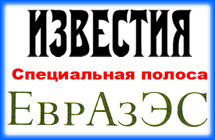
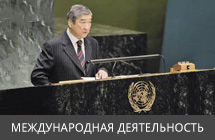
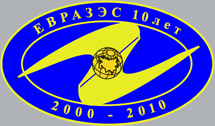
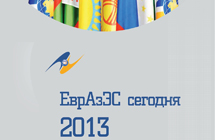
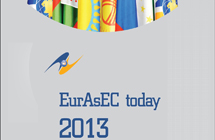
Поиск 10.10.2014 Заседание Межгосударственного совета ЕврАзЭС07.10.2014 Мультимедийная пресс-конференция в агентстве «Россия сегодня»03.10.2014 Встреча с Послом Финляндской Республики04.08.2014 Встреча Генерального секретаря ЕврАзЭС с Послом Республики Таджикистан20.06.2014 Премии Петербургского международного юридического форума «За вклад в развитие правовой интеграции на евразийском пространстве»28.05.2014 Договор о Евразийском экономическом союзе – важнейшее событие в новейшей истории наших стран25.05.2014 Презентация книги «Евразийский проект Нурсултана Назарбаева, воплощенный в жизнь. К 20-летию евразийского проекта 1994–2014»24.05.2014 VII АСТАНИНСКИЙ ЭКОНОМИЧЕСКИЙ ФОРУМ. Панельная сессия «Евразийской экономической интеграции – 20 лет. Итоги и перспективы»24.05.2014 VII Астанинский экономический форум и II Всемирная Антикризисная конференция, 21-23 мая 2014 года, Астана24.05.2014 Петербургский международный экономический форум, 23 – 24 мая 2014 года, Санкт-Петербург |

Евразийское экономическое сообщество
ЕврАзЭС
-
Страны участники
 Беларусь
Беларусь
-
 Казахстан
Казахстан
-
 Кыргызстан
Кыргызстан
-
 Россия
Россия
-
 Таджикистан
Таджикистан
-
 Узбекистан
Узбекистан
-
 Молдова
Молдова
-
 Украина
Украина



